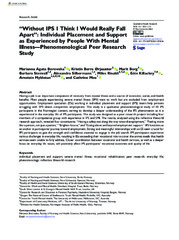| dc.contributor.author | Borowska, Marianna Agata | |
| dc.contributor.author | Ørjasæter, Kristin Berre | |
| dc.contributor.author | Borg, Marit | |
| dc.contributor.author | Stenvall, Barbara | |
| dc.contributor.author | Silbermann, Alexandra | |
| dc.contributor.author | Rinaldi, Miles | |
| dc.contributor.author | Killackey, Eoin | |
| dc.contributor.author | Mykletun, Arnstein | |
| dc.contributor.author | Moe, Cathrine Fredriksen | |
| dc.date.accessioned | 2024-11-12T10:21:30Z | |
| dc.date.available | 2024-11-12T10:21:30Z | |
| dc.date.issued | 2024-10-21 | |
| dc.description.abstract | Having a job is an important component of recovery from mental illness and a source of economic, social, and health
benefits. Most people experiencing severe mental illness (SMI) want to work but are excluded from employment
opportunities. Employment specialists (ESs) working in individual placement and support (IPS) teams help persons
struggling with SMI obtain competitive employment. This study is a qualitative phenomenological study of 10 IPS
participants in the Norwegian context, serving to develop a deeper understanding of the IPS phenomenon as it is
experienced in the everyday life of IPS participants. The study was designed as a peer research project including four
members of a competence group with experience in IPS and SMI. The results, analyzed using the reflective lifeworld
research approach, revealed four constituents: “Having a safety net along the way toward employment,” “Feeling more
like a person, not just a patient,” “Brighter future,” and “Going above and beyond employment support.” IPS functions as
an anchor in participants’ journey toward employment. Strong and meaningful relationships with an ES seem crucial for
IPS participants to gain the strength and confidence essential to engage in the job search. IPS participants experience
various challenges in everyday life, resulting in ESs exceeding their vocational role to cover the unmet needs that health
services seem unable to fully address. Closer coordination between vocational and health services, as well as a deeper
focus on everyday life issues, will positively affect IPS participants’ vocational outcomes and quality of life. | en_US |
| dc.identifier.citation | Borowska, Ørjasæter, Borg, Stenvall, Silbermann, Rinaldi, Killackey, Mykletun, Moe. “Without IPS I Think I Would Really Fall Apart”: Individual Placement and Support as Experienced by People With Mental Illness—Phenomenological Peer Research Study. Qualitative Health Research. 2024 | en_US |
| dc.identifier.cristinID | FRIDAID 2314361 | |
| dc.identifier.doi | 10.1177/10497323241275046 | |
| dc.identifier.issn | 1049-7323 | |
| dc.identifier.issn | 1552-7557 | |
| dc.identifier.uri | https://hdl.handle.net/10037/35665 | |
| dc.language.iso | eng | en_US |
| dc.publisher | Sage | en_US |
| dc.relation.journal | Qualitative Health Research | |
| dc.rights.accessRights | openAccess | en_US |
| dc.rights.holder | Copyright 2024 The Author(s) | en_US |
| dc.rights.uri | https://creativecommons.org/licenses/by/4.0 | en_US |
| dc.rights | Attribution 4.0 International (CC BY 4.0) | en_US |
| dc.title | “Without IPS I Think I Would Really Fall Apart”: Individual Placement and Support as Experienced by People With Mental Illness—Phenomenological Peer Research Study | en_US |
| dc.type.version | publishedVersion | en_US |
| dc.type | Journal article | en_US |
| dc.type | Tidsskriftartikkel | en_US |
| dc.type | Peer reviewed | en_US |


 English
English norsk
norsk
